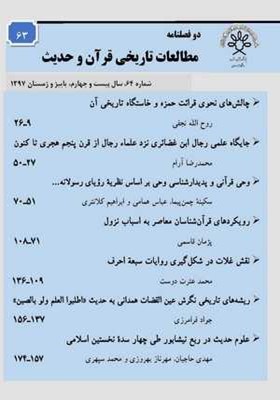چالشهای نحوی قرائت حمزه و خاستگاه تاریخی آن
محورهای موضوعی : تاریخ قرآن
1 - استادیار گروه قرآن و حدیث، دانشگاه خوارزمی، تهران، ایران
کلید واژه: اختلاف قرائات, مصحف ابن مسعود, تاریخ قرائات, مصحف عثمانی, حمزۀ کوفی, رسم عثمانی,
چکیده مقاله :
حمزة بن حبیب زَیّات قاری سرشناس کوفه در سدۀ 2ق است. قرائت وی از قرآن همواره در معرض توجه عالمان قرائت بوده است. قرائت حمزه با همۀ اهمیت و اعتبارش دارای برخی اشکالات نحوی است که گاه علیه وی اعتراضاتی را برانگیخته. قرائت جر الأَرْحَامِ در آیۀ نخست سورۀ نساء، قرائت غایب لایحسبنَّ در آیۀ 5سورۀ 9 انفال، قرائت مجهول یُخافا در آیۀ 229 سورۀ بقره، قرائت تثنیۀ یَبلُغانِّ در آیۀ 23 سورۀ اسراء و قرائت بدون تنوین ثلاثمائةِ در آیۀ 25 سورۀ کهف، نمونههایی از غرائب نحوی قرائت حمزه را به نمایش مینهند. مطالعۀ حاضر در پیجویی از راز رخداد این ماجرا به این نکته التفات یافته که التزام حمزه به مصحف عثمانی و تمایل همزمانش به مصحف ابن مسعود او را به چنین خوانشهای چالشبرانگیزی سوق داده است. در این سنخ نمونهها، هر چند از یک سو، مصحف ابن مسعود قرینهای در تأیید قرائت حمزه فراهم میآورد، از دیگر سو، تعلق خاطر به مصحف ابن مسعود است که حمزه را به چالش نحوی میکشاند.
Ḥamza-t bin Ḥabīb Zayyāt is the prominent Qārī of Kufa in the 2nd century AH. His reading of the Qur'an has always been the subject of scholarly attention. Ḥamza's reading, however, with all its significance and credibility has some syntactic flaws that sometimes provoke protests against him. The reading of the term "al-Arḥām" with I'rāb al-Jarr in the first verse of Surah Nisā, reading of 'Lā Yaḥsabanna' in the form of third person, in verse 5 of Surah 9 Anfāl, reading of 'Yukhāfā' in form of passive in verse 229 of Surah Baqara, reading of 'Yubaliqāni' in deuteronomy from in verse 23 of Surah Isrā and reading of ‘Thalāthami’ in verse 25 of Surah al-Kahf, without Tanwin, are some examples of syntactic alienations presented by Hamzah. The present study seeks to elucidate the mystery of this phenomenon by the fact that Hamza's commitment to the Ottoman’s Mushaf and his simultaneous inclination to Ibn Mas'ūd’s manuscript have led him to such challenging readings. In this type of examples, although, ibn Ma’sūd’ Mushaf provides a sympathetic account of the reading of Hamzah on the one hand, but and on the other hand, his belonging to the Mushafd of Ibn Mas'ūd is what challenges Hamza.
_||_

